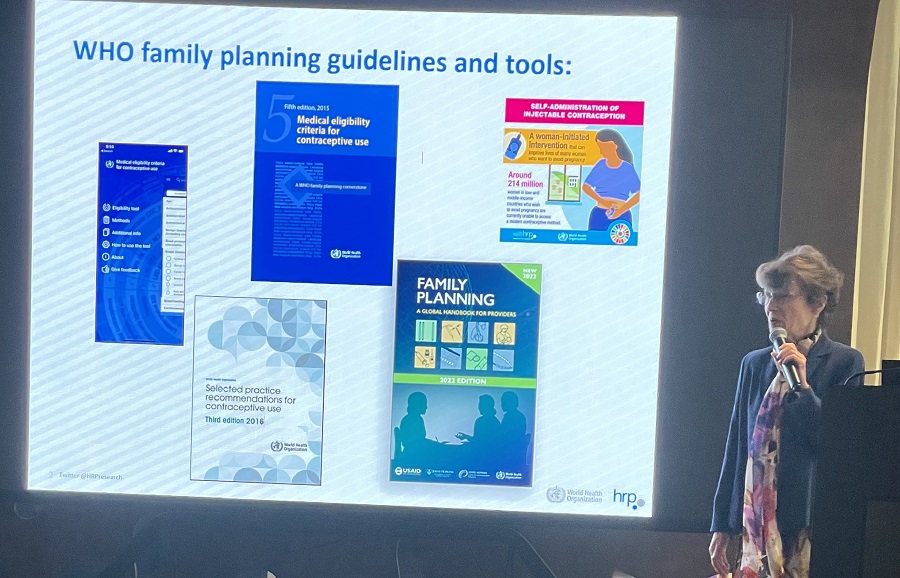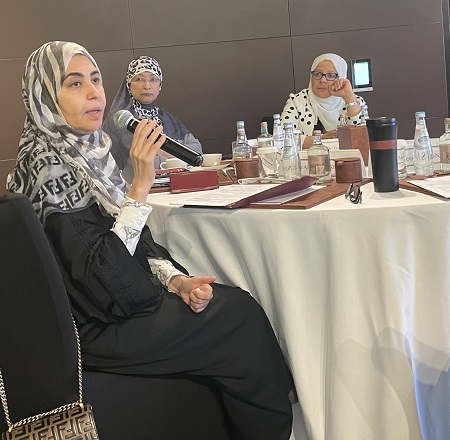
13 March 2023, Doha – The Qatari Ministry of Public Health, in collaboration with WHO, organized a national consultative workshop on developing family planning national guidelines, on Monday, 13 March in Doha. The workshop was inaugurated by Dr Najat Al-Khenyab, Women’s National Lead for Healthy Women, representing Sheikh Dr Mohamed Ben Hamad Al-Thani, Director of Public Health, Qatari Ministry of Public Health, and Dr Rayana Bou Haka, WHO Representative in Qatar.
The consultative workshop focused mainly on introducing and validating the draft national guidelines for family planning in Qatar. The draft guidelines reflected relevant information from WHO guidelines relating to family planning and women’s related health issues including the latest WHO family planning handbook that was just updated at the end of 2022.
In the opening remarks Dr Najat said that this workshop was being held in line with Qatar’s national vision 2030 and the national health strategy 2018–2022 and strategic objectives of 2017–2022, which aim to establish a comprehensive and integrated system that introduces effective solutions to current and future health challenges.
 Dr Najat Al-Khenyab, Women’s National Lead for Healthy Women, Qatari Ministry of Public Health
Dr Najat Al-Khenyab, Women’s National Lead for Healthy Women, Qatari Ministry of Public Health
Thanking WHO and partners who contributed to organizing the workshop, Dr Najat noted that, “One of the activities in the area of maternal and child health that the public health department has worked on in collaboration with WHO was the preparation of national guidance for the guiding principles of family planning. This national guidance is one of the achievements of the third objective related to establishing services for women at the prenatal phase and improving reproductive health services.
Dr Rayana Bou Haka highlighted the importance of collaboration between WHO and the Ministry in this area of work. “WHO is keen on working closely with the Ministry of Public Health in Qatar and with key health stakeholders on ensuring that the development of these guidelines is based on the most updated guidelines and evidence available. The updates are aimed at improving maternal and family based on the national context”.
The workshop outlined the family planning status in Qatar. Around 68% of women in Qatar are satisfied with the family planning services introduced in the country. However, there is still unmet needs for more family planning services with safer choices.
“Qatar is doing a good job with improving family planning services. Policy, regulations and guidelines need to be put in place and guidelines need to be translated to services to meet the unmet needs,” said Dr Karima Gholbzouri, WHO Regional Advisor for Sexual and Reproductive Health and Research in the WHO Regional Office for the Eastern Mediterranean.
“Qatar is the first country that WHO has come to with the updated global guidelines,” Dr Marylen Gaffield, Sexual and Reproductive Health and Research in WHO headquarters said,
Other chapters address family planning services during pandemics with a focus on Ebola and zika. Family planning services were compromised during the COVID-19 pandemic which had a significant impact on women in many countries”.
Important and key questions raised and discussed during the workshop included how effective family planning methods were, what were the most effective methods and how to make them more effective.
“By the end of the consultative workshop and based on the deep discussions, working sessions and interventions of the participants, Qatar will have a national family planning guidelines document that is fully owned by the Ministry and reflects the actual needs of Qatari women and families,” Dr Bou Haka concluded.




